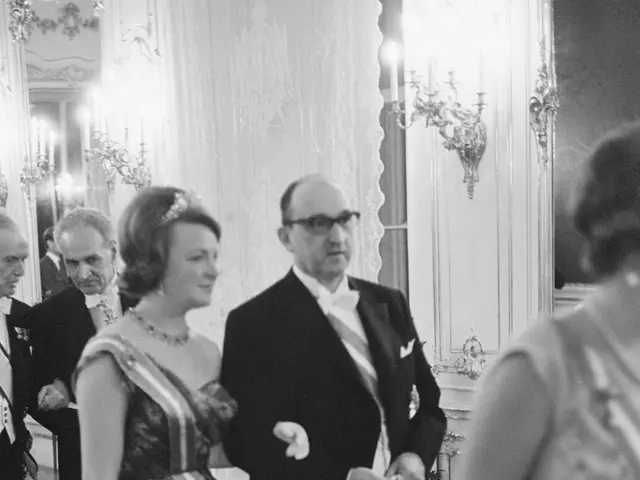Astrological practices, including Tarot readings and horoscopes, seeing increased popularity among Kazakh citizens
Modern youth,or Gen Z and millennials, are gravitating towards astrology, tarot, and other esoteric practices at an alarming rate. In today's uncertain world, with shifting job markets, political instability, and increasing social isolation, these young individuals are seeking ways to regain control over their lives.
A comprehensive analytical report, commissioned in 2024 by the Kazakh Ministry of Culture and Information, sheds light on the values and interests of youth. While specific numbers about the fascination with astrology aren't publicly available, the report does indicate that the youth is expressing interest in alternative forms of self-awareness and spiritual practices.
Official statistics from the National Bureau of Statistics of Kazakhstan reveal that Kazakhs spent a staggering 39.1 million tenge on astrology, spiritualism, and fortune-telling services in 2023, with 25.3 million tenge of that spent in Astana alone.
The popularity of esotericism has been bolstered by social media platforms such as TikTok and Instagram, where short videos about horoscopes, tarot spreads, and magical practices are rapidly shared among users. A new digital community is forming, using esotericism as a means of self-expression.
Whereas a few years ago, people turned to the occult sciences for predictions about the future or to seek answers to pressing questions, today's Kazakhs are using esotericism for more ordinary purposes. For example, a study by the Kazakh company Edu Birdie published in the fall of 2024 found that 41% of Gen Z and millennials research the zodiac sign of their potential bosses and colleagues before accepting a job offer.
Kazakh society has experienced a shift in its interest in the esoteric, moving it out of private spaces and into the public eye. A high-profile case involving former minister of national economy Kuandyk Bishimbayev and the murder of Saltanat Nukenova highlighted the presence of occult practices within the corridors of power.
TikTok, Instagram, and YouTube have given rise to a massive contingent of influencers, including astrologers, tarot readers, and esoteric practitioners, who are shaping an entire media space with a distinct aesthetic, terminology, and even sound trends. Esotericism has become visual, trendy, and easily accessible, making its way onto the feeds of many users.
This explosion of interest in magical thinking coincides with crises of trust in institutions such as the state, science, and traditional organizations. Tarot reader Aseem Musanova attributes this interest in astrology, tarot cards, or rituals to a desire for predictability:
"'When people feel like they're losing control, they instinctively turn to symbolic systems - magic, myth, ritual. It gives the illusion of understanding the world and reduces anxiety. Take, for instance, a woman who had lost her job, her loved one, and her self-belief: through energy cleansings and manifestation practices, she managed to regain her job and find new meaning in life,'" says the tarot reader.
Psychologists view this interest in esotericism as a natural reaction to uncertainty, anxiety, and a lack of control over one's life, particularly during unstable times. However, specialists caution that a fascination with esotericism becomes problematic when people forgo rational problem-solving methods in favor of fortune-tellers or base significant life decisions on horoscopes. In the case of politicians and officials, this can lead to potentially dangerous situations:
"'When decisions affecting the lives of thousands are made under the influence of subjective interpretations and rituals, it's no longer a personal choice, but a systemic risk,'" notes psychologist Zhazira Sardanova.
The digital age facilitates access to a plethora of international esoteric traditions, such as Wicca’s Wheel of the Year and Sabbats. Youth in transitional societies often explore non-traditional belief systems as a counterpoint to inherited cultural or religious norms. Online spaces like forums and apps provide structured frameworks for astrology and esoteric practices, making them more accessible.
Anxiety and uncertainty stemming from economic or political instability may drive interest in astrology as a coping mechanism for perceived loss of control. The normalization of astrology and esotericism, as observed in Western wellness culture, may lead to commercialization, with markets for related goods expanding locally and creating economic niches. Increased interest in esotericism could also strengthen peer networks but potentially alienate older generations or religious institutions.
Despite increased interest in the esoteric, authorities should prioritize transparency, explainability, and trust to reduce the desire for the irrational among citizens and managers alike. Whether this trend will become a long-term cultural norm remains to be seen.
- Modern Kazakhs are increasingly interested in astrology, spending significant amounts on astrology, spiritualism, and fortune-telling services, as indicated by official statistics.
- The popularity of astrology and other esoteric practices among the youth of Kazakhstan has been bolstered by social media platforms, forming a new digital community for self-expression.
- Tarot reader Aseem Musanova attributes the increased interest in astrology and tarot cards to a desire for predictability among people who feel they are losing control.
- Psychologists view this interest in esotericism as a natural reaction to uncertainty and a lack of control over one's life, particularly during unstable times.
- The normalization and commercialization of astrology and esotericism could potentially lead to economic opportunities, but it also risks alienating older generations and religious institutions.








